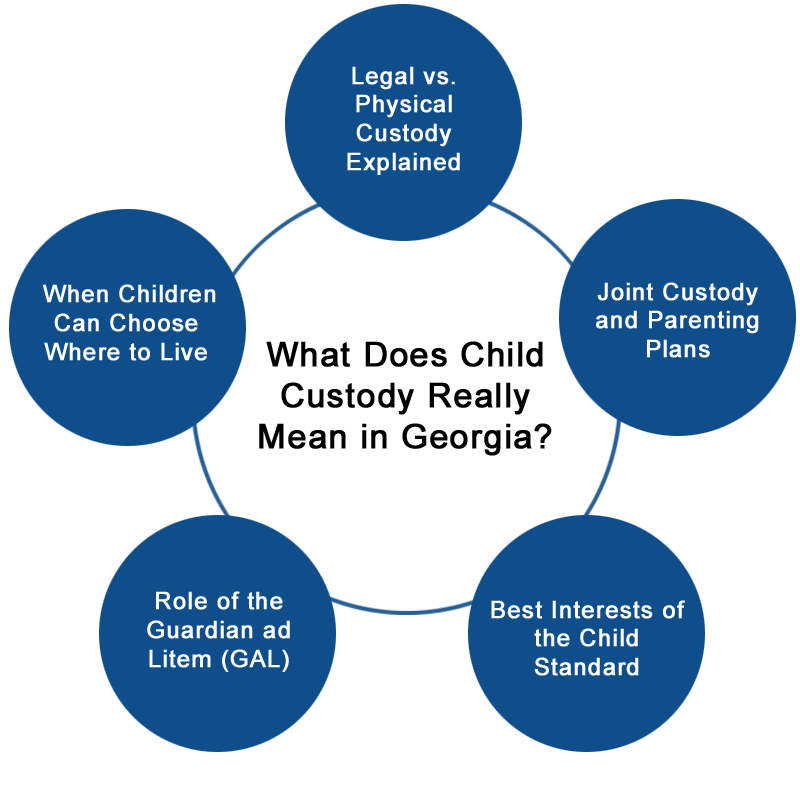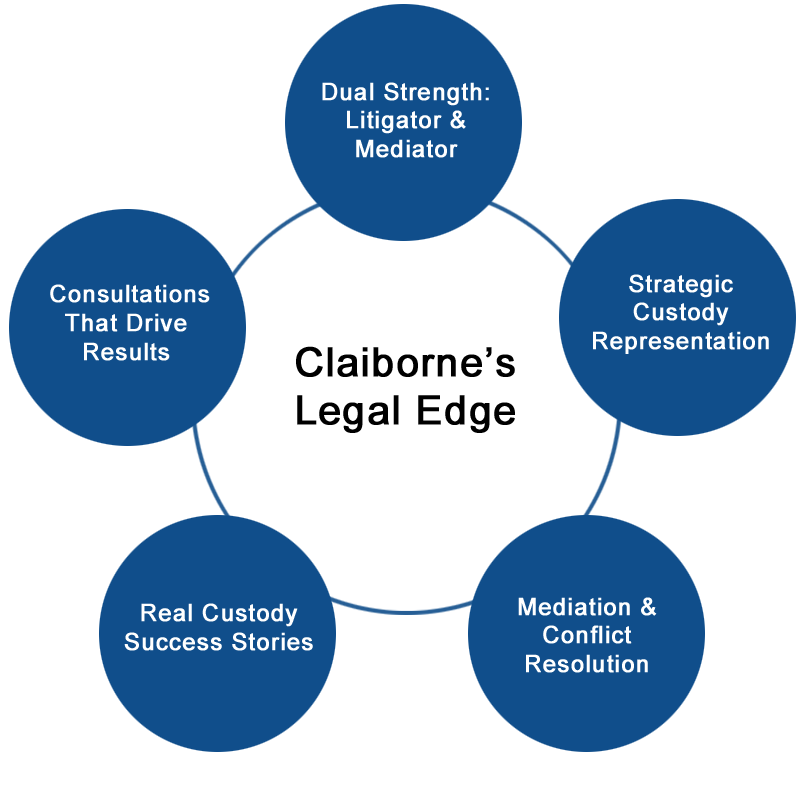
Savannah Child Custody Attorney
In Georgia, few areas of family law carry the kind of emotional weight and legal complexity that child custody disputes can. The stakes simply couldn’t be higher, because you’re not just deciding on the logistics of where a child will live or who will pay for its support. You’re defining what your role will be as a parent to your child. You’re writing the rules of your relationship with them in a way that will massively impact their future for years to come.
These incredibly high stakes, amplified by fear of losing time with your child, fears for their well-being and the emotional toll of a court case, culminate in an emotionally charged process. And unless both parents can come to an agreement outside of the court, such as through mediation, the final decision in this all-important process will be made by the judge.
Child Custody: Understanding the Bigger Picture
Despite whatever animosity might exist between the parents, the issue of custody is ultimately one of deciding what’s best for the child. Approaching the situation with a mindset of putting the child’s needs before your own can only benefit everyone involved, preventing unneeded conflict, protecting the child and saving money. It’s simply a matter of taking a step back emotionally, developing better avenues of communication, and knowing when to be the bigger person.
FAQ: What is Custody Really About?
Being granted custody of a child means having legal AND physical custody of the child. Legal custody entails giving one parent full authority over the child’s education, religion, healthcare and extracurricular activities. Physical custody determines where the child will spend the majority of their time. Sometimes this means sole custody (the child living full-time with one parent) or joint custody (the child splitting time between the two homes, although time spent at each is not always equal). Courts will generally award joint legal custody to both parents, requiring each to follow the parenting plan, stay actively involved in their child’s life, communicate and make decisions together. If they can’t, they risk further intervention from the court.
Because a courtroom is not the proper place for airing grievances or settling scores during a custody dispute. The judge is not there to assign blame – they are there to protect the safety, stability and emotional well-being of the child. That doesn’t necessarily mean the judges are determining who deserves custody more, or who is a perfect parent. The courts don’t require perfection, they require strong, stable parenting. That means providing a stable environment, being emotionally mature enough to support a child, and maintaining that support, even when times are tough.
FAQ: How Are the “Best Interests of the Child” Determined?
There are several relevant factors that the judge will weigh in determining what constitutes the child’s best interests. These include environmental factors – what kind of home stability and safety the child can expect, the bond they have with each parent, their ties to the community and their performance in school. They will also include factors that speak to each parent’s fitness – their physical and mental health; whether they have a history of substance issues, neglect, or abuse; which one has served as the child’s “primary caregiver”; and whether they will support the child’s relationship with the other parent.
 If both parents can work together in full cooperation with clear communication, and can agree on a plan for custody and parenting, Georgia law will likely compel the judge to grant joint custody. If they can’t, the judge will render a decision following a trial or final hearing that he or she feels will best serve the child.
If both parents can work together in full cooperation with clear communication, and can agree on a plan for custody and parenting, Georgia law will likely compel the judge to grant joint custody. If they can’t, the judge will render a decision following a trial or final hearing that he or she feels will best serve the child.
Their decision will be based on several factors. Through the trial, the judge will evaluate each parent’s ability to care for the child, consider the kind of environment they can provide, and take the child’s preference into consideration if they are over 11 years of age. The judge may also order a custody evaluation or appoint a Guardian ad Litem (GAL).
A court-appointed advocate for the child’s best interests, the GAL will dig further into the case by interviewing parents, the child’s teachers and others who are close to the child so the court can better understand how to best serve the child. The GAL will also give their own recommendation to the judge.
FAQ: Can a Child Choose Where to Live?
Under Georgia law, yes. If they are 14 years of age or older, the child will have the legal right to choose for themselves which parent they’ll live with. If the judge determines that the child’s decision does not pose a risk to them, they will typically follow the child’s wishes.
These proceedings can be even more intense if one of the parents is inherently unfit, due to a history of abuse, neglect, instability or substance abuse. This added intensity comes from the fact that the other parent can’t simply make this accusation without substantial proof, be it police reports, text messages, witness testimony or medical records. The stronger the evidence against the unfit parent, the greater the chance that the other will be granted full custody.
After all evidence has been weighed, including the recommendation of the GAL if needed, the judge will issue a decision that will serve as a legally binding court order.
Mediator and Litigator: What Sets the Claiborne Firm Apart
Being both an experienced trial attorney and certified mediator, lead attorney William R. Claiborne offers a wholly unique dual skillset and perspective to child custody cases.
With the stakes of a custody case being so high, he pursues the case with the strategic and aggressive, yet compassionate, soul of a litigator. This means going beyond what’s presented in court with independent investigative work that digs deeper into the evidence, fortifying your case with rock-solid facts. It means showing up to court fully prepared with knowledge of the law, the facts at hand, and your own story. And it means looking out for you, with cost-effective solutions that avoid hefty legal bills. If possible, we resolve your case strategically with solutions that reduce conflict, protect your finances, and best serve your child.
And part of that strategy comes from Claiborne’s lengthy history as a certified mediator. Along with an aggressive legal strategy, we utilize targeted mediation and Alternative Dispute Resolution (ADR) methods that have been proven to resolve cases with less conflict and hardship.
Being a mediator means understanding human behavior, and that understanding fuels Claiborne’s unique strategy. He understands how people communicate (or fail to communicate) under stress, reading their tone and body language to determine the underlying emotions left unsaid. He sees how emotions fuel conflict, and how to create a space where those emotions can be expressed and understood, rather than argued over. It’s an art and science rooted in empathy, de-escalation and neutrality.
 William R. Claiborne brings both the table: the relentless advocacy of an attorney and the passion for compromise of a mediator. In combining these two mindsets, he gives clients a rare strategic edge in ensuring the best outcome without sacrificing relationships within the family. With emotions running high and the stakes even higher, the ability to either avoid the strain of a trial through mediation or build a cohesive strategy in court can make all the difference.
William R. Claiborne brings both the table: the relentless advocacy of an attorney and the passion for compromise of a mediator. In combining these two mindsets, he gives clients a rare strategic edge in ensuring the best outcome without sacrificing relationships within the family. With emotions running high and the stakes even higher, the ability to either avoid the strain of a trial through mediation or build a cohesive strategy in court can make all the difference.
If possible, we settle the matter through mediation that prizes cooperation and compromise. If necessary, we pursue the issue through the courts with an exhaustively researched, meticulous strategy to reach the best outcome. We investigate. We gather evidence. We prepare ourselves for every eventuality. And we build a fact-based case grounded in the truth and structured around you.
The results speak for themselves. In one case, a parent came to us after being denied physical custody by a judge who had been swayed by their former spouse’s inaccurate and false claims. After carefully reviewing the record of the case, we unearthed a procedural error that had dishonestly impacted the judge’s decision. Despite the case being finalized, we fought to have it reopened based on this new evidence, and helped our client regain joint custody and begin rebuilding their relationship with their child. In another case, a parent had been denied custody due to what the judge perceived as a lack of stability and came to us for help. We worked closely with them to demonstrate to the court that they had rebuilt a stable environment by gathering documentation, character evidence and witness testimony. We showed the judge how their presence was crucial to the child’s well-being. And we helped our client regain shared physical custody and the dignity of co-parenting their child.
All of these success stories started with our $450 initial confidential consultation. During this no-obligation meeting, we will work with you to fully understand your situation, review all available evidence, and begin crafting a strategy to achieve your goals. Whether you’re trying to protect your child from an unsafe environment or just preserving your rights to custody and equal time as a parent, we know Georgia’s custody laws like few others. And we know how to apply those laws to get the results you need.
The ultimate goal is to preserve what matters most – your relationship with your child. And it all starts when you fill out the contact information below and schedule your consultation.
Call (912) 351-8775 or Contact Us Online
